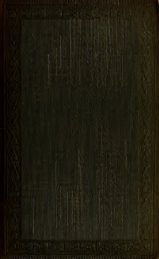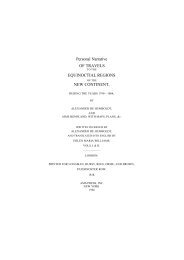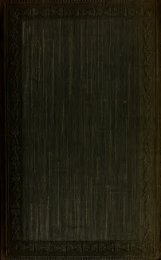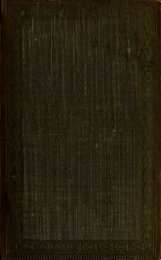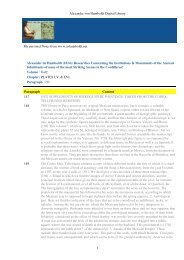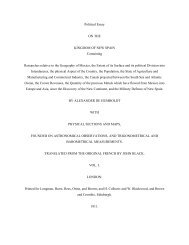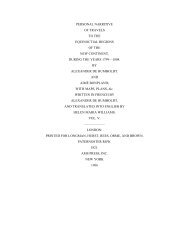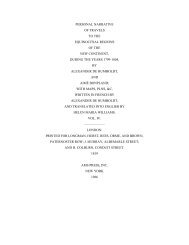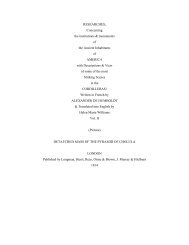See the complete document here
See the complete document here
See the complete document here
Create successful ePaper yourself
Turn your PDF publications into a flip-book with our unique Google optimized e-Paper software.
250<br />
COSMOS.<br />
iireat maritime nations of Italy—<strong>the</strong> Venet.'ans and Genoese—•<br />
by his descriptions<br />
of <strong>the</strong> inexhaustible treasures of Eastern<br />
Asia. He is acquainted with <strong>the</strong> " silver walls and gdlden<br />
towers" of Quinsay, <strong>the</strong> present Hangtscheufu, although he<br />
Joes not mention <strong>the</strong> name of this great commercial mart,<br />
which twenty-five years later acquired such celebrity from<br />
Marco Polo, <strong>the</strong> greatest traveler of any age.* Truth and<br />
naive error are singularly intermixed in <strong>the</strong> Journal of Rabru<br />
quis, which has been preserved to us by R-oger Bacon. Near<br />
Khatai, which is bounded by <strong>the</strong> Eastern Sea, he describes a<br />
happy land, "w<strong>here</strong>, on <strong>the</strong>ir arrival from o<strong>the</strong>r countries, all<br />
men and women cease to grow old."t<br />
More credulous than <strong>the</strong> monk of Brabant, and <strong>the</strong>refore,<br />
perhaps, far more generally read, was <strong>the</strong> English knight Sir<br />
Tana (Asof), CafTa, and <strong>the</strong> Erdil (<strong>the</strong> Volga), Alani and Gothic tiibes<br />
speakmg German. (Ramusio, Delle Navigationi et Viaggi, vol. u., p.<br />
92 b. and 98 a.) Roger Bacon merely terms Rubruquis Irater Willielinus,<br />
quem dominus Rex Franciae misit ad Tartaros.<br />
* The great and admirable work of Marco Polo {II Milione di Messei<br />
Marco Polo),<br />
as we it possess in <strong>the</strong> correct edition of Count Baklelli,<br />
is inappropriately termed <strong>the</strong> narrative of " Travels.''^ It is, for <strong>the</strong><br />
most part, a descriptive, one might say, a statistical work, in which it is<br />
difficult to distinguish what <strong>the</strong> traveler had seen himself, and what he<br />
had learned from o<strong>the</strong>rs, and what he derived from topographical de-<br />
Bcriptions, in which <strong>the</strong> Chinese literature is so rich, and which might<br />
be accessible to him through his Persian interpreter. The striking<br />
similarity presented by <strong>the</strong> narratives of <strong>the</strong> travels of Hiuan-thsung,<br />
<strong>the</strong> Buddhistic pilgrim of <strong>the</strong> seventh century, to that which Marco<br />
Polo found in 1277 (respecting <strong>the</strong> Pamir-Highland), early attracted my<br />
whole attention. Jacquet, who was unhappily too early removed by<br />
a premature death from <strong>the</strong> investigation of Asiatic languages, and who,<br />
like Klaproth and myself, was long occupied with <strong>the</strong> work of tlie great<br />
Venetian traveler, wrote to me as follows shortly before his decease<br />
" I am as much struck as yourself by <strong>the</strong> composition of <strong>the</strong> Milione<br />
It is undoubtedly founded on <strong>the</strong> direct and personal observation of <strong>the</strong><br />
traveler, but he probably also made use of <strong>document</strong>s ei<strong>the</strong>r officially<br />
or privately communicated to him. Many things appear to have been<br />
borrowed from Chinese and Mongolian works, it is although difficult<br />
to determine <strong>the</strong>ir precise influence on <strong>the</strong> composition of <strong>the</strong> Milione,<br />
owing to <strong>the</strong> successive translations from which Polo took his extracts.<br />
While our modern travelers are only too well pleased to occupy <strong>the</strong>ir<br />
readers with <strong>the</strong>ir personal adventures, Marco Polo takes pains to blend<br />
liis own observations with <strong>the</strong> official data communicated to him, of<br />
which, as governor of <strong>the</strong> city of Yangui, he was able to have a large<br />
number." (<strong>See</strong> my Asie Centrale, t.<br />
ii., p. 395.) The compiling<br />
method of <strong>the</strong> celebrated traveler likewise explains <strong>the</strong> possibility of<br />
his being able to dictate his book at Genoa in 1295 to his fellow-prison*<br />
er and friend, Messer Rustigielo of Pisa, as if <strong>the</strong> <strong>document</strong>s had been<br />
lying before him. {Comjiare Marsden, Travels of Marco Polo, p<br />
Kxxiii.)<br />
t Purchas, PU^nm%, Part iii., ch. 28 and 5G (p. 23 and 34).



